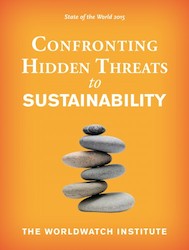Americans have had some recent relief at the pump but it may be short-lived. According to State of the World 2015, long-term energy costs are on the rise. Why? America’s, along with other countries’ growing debt. Author John  Hagens a former hedge fund manager who now teaches human macro-ecology at University of Minnesota, said nations are papering over these costs with debt. He continues that higher energy costs are leading to continued recessions, excess claims on future national resources, and more-severe social inequality and poverty.
Hagens a former hedge fund manager who now teaches human macro-ecology at University of Minnesota, said nations are papering over these costs with debt. He continues that higher energy costs are leading to continued recessions, excess claims on future national resources, and more-severe social inequality and poverty.
State of the World finds that the relatively low cost of energy extraction of oil, coal and natural gas, compared to the benefits seen from fossil fuels may be the most important factor in the industrialized world’s economic success. Historically, the report continues, large quantities of inexpensive fuels were available even after accounting for the energy lost to extract and process them. But, as remaining fuels become less accessible, higher energy costs will have ripple effects through economies built around continued large energy-input requirements. Rising costs, the report states, will endanger highly energy-intensive industries and practices—including the energy sector itself—as well as widen and deepen poverty as everything becomes more expensive.
“Despite having ‘plenty of energy,’ higher physical costs [of extraction] suggest that energy likely will rise from a historical average of 5 percent of GDP [gross domestic product], to 10–15 percent of GDP or higher,” writes Hagens.
 In the short term, Hagen notes nations are taking on growing debt to avoid losses in GDP—an indicator of the economic health of a country. Since 2008, the Group of Seven nations (Canada, France, Germany, Italy, Japan, the United Kingdom, and the United States) have added about $1 trillion per year in nominal GDP, but only by increasing their debt by over $18 trillion.
In the short term, Hagen notes nations are taking on growing debt to avoid losses in GDP—an indicator of the economic health of a country. Since 2008, the Group of Seven nations (Canada, France, Germany, Italy, Japan, the United Kingdom, and the United States) have added about $1 trillion per year in nominal GDP, but only by increasing their debt by over $18 trillion.
However, Hagens argues, continued use of credit to mask the declining productivity of energy extraction is unsustainable. For each additional debt dollar, less and less GDP is generated, and, at the same time, our highest-energy-gain fuels are being depleted. Energy is becoming more expensive for the creditor in the future than for the debtor in the present.
“We have entered a period of unknown duration where things are going to be tough,” writes Hagens. “But humanity in the past has responded in creative, unexpected ways with new inventions and aspirations.” While policy choices such as banking reform, a carbon and consumption tax, and moving away from GDP as a proxy for well-being are good long-term ideas, “we urgently need institutions and populations to begin to prepare…for a world with the same or less each year instead of more.”

